小学英语重点疑问句归纳
小学英语必须掌握的8个特殊疑问句(附例句)
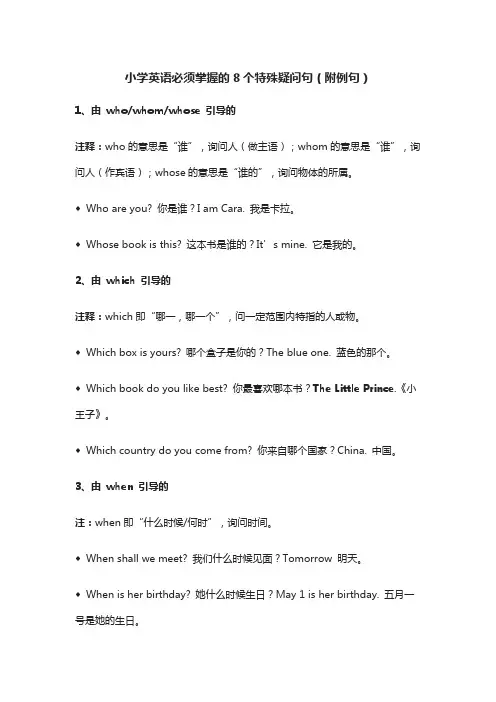
小学英语必须掌握的8个特殊疑问句(附例句)1、由who/whom/whose 引导的注释:who的意思是“谁”,询问人(做主语);whom的意思是“谁”,询问人(作宾语);whose的意思是“谁的”,询问物体的所属。
◆Who are you? 你是谁?I am Cara. 我是卡拉。
◆Whose book is this? 这本书是谁的?It’s mine. 它是我的。
2、由which 引导的注释:which即“哪一,哪一个”,问一定范围内特指的人或物。
◆Which box is yours? 哪个盒子是你的?The blue one. 蓝色的那个。
◆Which book do you like best? 你最喜欢哪本书?The Little Prince.《小王子》。
◆Which country do you come from? 你来自哪个国家?China. 中国。
3、由when 引导的注:when即“什么时候/何时”,询问时间。
◆When shall we meet? 我们什么时候见面?Tomorrow 明天。
◆When is her birthday? 她什么时候生日?May 1 is her birthday. 五月一号是她的生日。
◆When do you get up every day? 你每天什么时候起床?At 6:00 a.m. 早上六点。
4、由where 引导的注:where即“哪里,在哪里”,询问地点。
◆Where will you spend the summer holiday? 你会去哪里过暑假?I'm going to Hawaii. 我要去夏威夷。
◆Where is your coat? 你的外套在哪啊?It’s on the sofa. 在沙发上。
5、由why 引导的注:why即“为什么”,询问原因,回答从句一般由because引导。
◆Why isn’t he at school today? 他今天为什么不在学校?Because he is ill. 因为他生病了。
小学英语疑问句型汇总大全
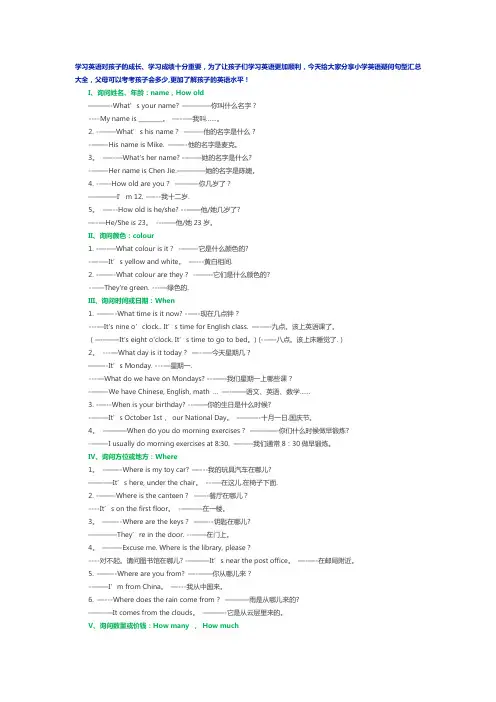
学习英语对孩子的成长、学习成绩十分重要,为了让孩子们学习英语更加顺利,今天给大家分享小学英语疑问句型汇总大全,父母可以考考孩子会多少,更加了解孩子的英语水平!I、询问姓名、年龄:name,How old———-What’s your name? ————你叫什么名字?----My name is ________。
—--—我叫……。
2. --——What’s his name?—-—-他的名字是什么?-——-His name is Mike. ——--他的名字是麦克。
3。
-—-—What's her name? -—-—她的名字是什么?-——-Her name is Chen Jie.————她的名字是陈婕。
4. --—-How old are you?-———你几岁了?————I’m 12. -—--我十二岁.5。
-—--How old is he/she? --——他/她几岁了?—-—He/She is 23。
--——他/她23岁。
II、询问颜色:colour1. -—-—What colour is it?-——-它是什么颜色的?-—-—It’s yellow and white。
—---黄白相间.2. -——-What colour are they?-——-它们是什么颜色的?---—They're green. ---—绿色的.III、询问时间或日期:When1. ——--What time is it now? --—-现在几点钟?---—It's nine o’clock.. It’s time for English class. —-—-九点。
该上英语课了。
(—-——It's eight o'clock. It’s time to go to bed。
) (--—-八点。
该上床睡觉了.)2。
---—What day is it today?—--—今天星期几?——--It’s Monday. ---—星期一.---—What do we have on Mondays? --——我们星期一上哪些课?-——-We have Chinese, English, math …—-——语文、英语、数学……3. -—--When is your birthday? --——你的生日是什么时候?-—-—It’s October 1st,our National Day。
小学英语重点疑问句归纳
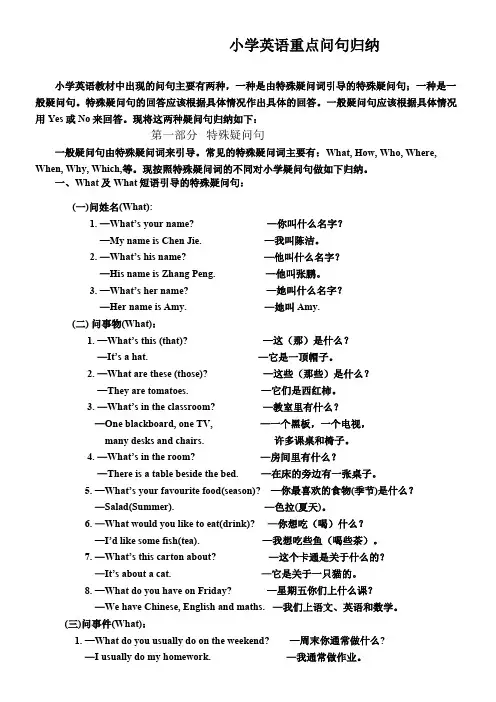
小学英语重点问句归纳小学英语教材中出现的问句主要有两种,一种是由特殊疑问词引导的特殊疑问句;一种是一般疑问句。
特殊疑问句的回答应该根据具体情况作出具体的回答。
一般疑问句应该根据具体情况用Yes或No来回答。
现将这两种疑问句归纳如下:第一部分特殊疑问句一般疑问句由特殊疑问词来引导。
常见的特殊疑问词主要有:What, How, Who, Where,When, Why, Which,等。
现按照特殊疑问词的不同对小学疑问句做如下归纳。
一、What及What短语引导的特殊疑问句:(一)问姓名(What):1. —What’s your name? —你叫什么名字?—My name is Chen Jie. —我叫陈洁。
2. —What’s his name? —他叫什么名字?—His name is Zhang Peng. —他叫张鹏。
3. —What’s her name? —她叫什么名字?—Her name is Amy. —她叫Amy.(二) 问事物(What):1. —What’s this (that)? —这(那)是什么?—It’s a hat. —它是一顶帽子。
2. —What are these (those)? —这些(那些)是什么?—They are tomatoes. —它们是西红柿。
3. —What’s in the classroom? —教室里有什么?—One blackboard, one TV, —一个黑板,一个电视,many desks and chairs. 许多课桌和椅子。
4. —What’s in the room? —房间里有什么?—There is a table beside the bed. —在床的旁边有一张桌子。
5. —What’s your favourite food(season)? —你最喜欢的食物(季节)是什么?—Salad(Summer). —色拉(夏天)。
小学英语疑问句汇总
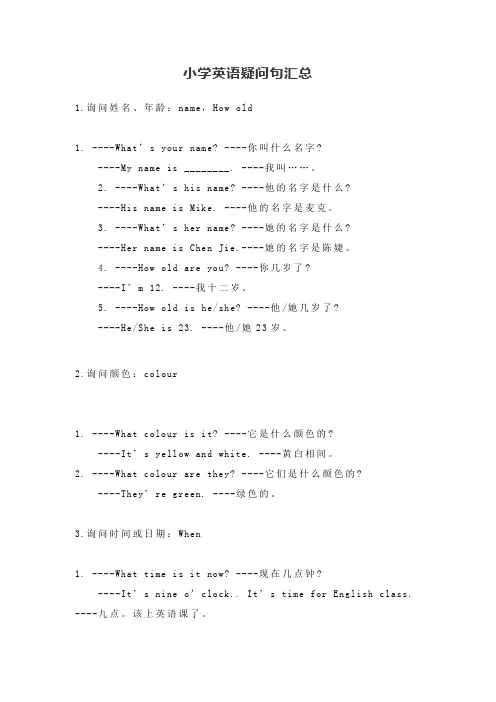
小学英语疑问句汇总1.询问姓名、年龄:name,How old1. ----What’s your name? ----你叫什么名字?----My name is ________. ----我叫……。
2. ----What’s his name? ----他的名字是什么?----His name is Mike. ----他的名字是麦克。
3. ----What’s her name? ----她的名字是什么?----Her name is Chen Jie.----她的名字是陈婕。
4. ----How old are you? ----你几岁了?----I’m 12. ----我十二岁。
5. ----How old is he/she? ----他/她几岁了?----He/She is 23. ----他/她23岁。
2.询问颜色:colour1. ----What colour is it? ----它是什么颜色的?----It’s yellow and white. ----黄白相间。
2. ----What colour are they? ----它们是什么颜色的?----They’re green. ----绿色的。
3.询问时间或日期:When1. ----What time is it now? ----现在几点钟?----It’s nine o’clock.. It’s time for English class. ----九点。
该上英语课了。
(----It’s eight o’clock. It’s time to go to bed.) (----八点。
该上床睡觉了。
)2. ----What day is it today? ----今天星期几?----It’s Monday. ----星期一。
----What do we have on Mondays? ----我们星期一上哪些课?----We have Chinese, English, math …----语文、英语、数学……3. ----When is your birthday? ----你的生日是什么时候?----It’s October 1st, our National Day. ----十月一日.国庆节。
小学英语疑问句总结
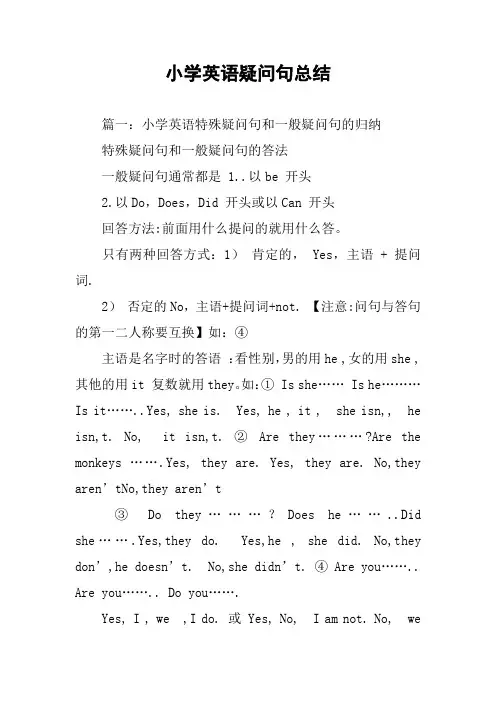
小学英语疑问句总结篇一:小学英语特殊疑问句和一般疑问句的归纳特殊疑问句和一般疑问句的答法一般疑问句通常都是 1..以be 开头2.以Do,Does,Did 开头或以Can 开头回答方法:前面用什么提问的就用什么答。
只有两种回答方式:1)肯定的, Yes,主语 + 提问词.2)否定的No,主语+提问词+not. 【注意:问句与答句的第一二人称要互换】如:④主语是名字时的答语:看性别,男的用he ,女的用she ,其他的用it 复数就用they。
如:① Is she…… Is he………Is it……..Yes, she is. Yes, he , it , she isn,, he isn,t. No, it isn,t. ②Are they………?Are the monkeys …….Yes, they are. Yes, they are. No,they aren’tNo,they aren’t③Do they.........?Does he.. (i)she…….Yes,they do. Yes,he , she did. No,they don’,he doesn’t. No,she didn’t. ④ Are you…….. Are you…….. Do you…….Yes, I , we ,I do. 或 Yes, No, I am not. No, wearen’t. No,I don’t. 或No,⑤ Does Mike…….Is ChenJi…..Do your parents…Yes ,he does. Yes , she , they do. No,he doesn’t. No, she isn’,they don’t.一、专项练习。
11. Did ChenJie read books yesterdaythe girl cook the meals ?—————————————————————————————he going to swim this afternoon4. Are they going to take a trip next weend————————————————————————————————5.Does he often go to school by bike 6. Do you play basketball every weekend———————————————————————————————————7. Did Mike do his homework yesterday?8. Are they playing basketball now————————————————————————————————一般疑问句及特殊疑问句的总结一般疑问句的定义:用yes或no来回答的疑问句叫一般疑问句。
小学英语必须掌握的八个特殊疑问句(附例句)
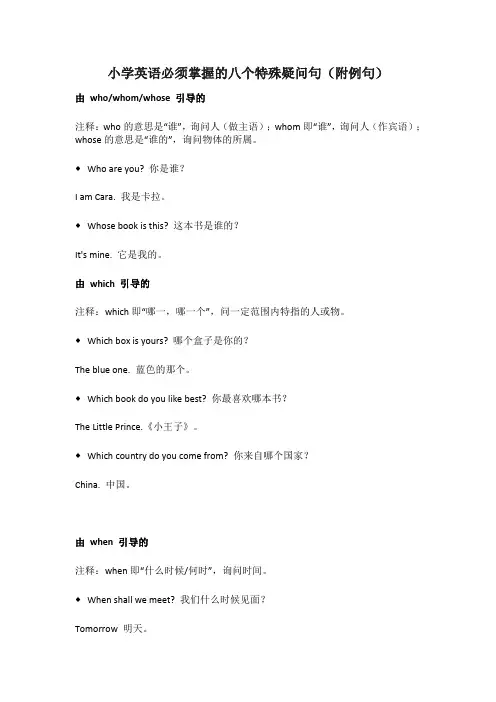
小学英语必须掌握的八个特殊疑问句(附例句)由who/whom/whose 引导的注释:who的意思是“谁”,询问人(做主语);whom即“谁”,询问人(作宾语);whose的意思是“谁的”,询问物体的所属。
◆ Who are you? 你是谁?I am Cara. 我是卡拉。
◆ Whose book is this? 这本书是谁的?It's mine. 它是我的。
由which 引导的注释:which即“哪一,哪一个”,问一定范围内特指的人或物。
◆ Which box is yours? 哪个盒子是你的?The blue one. 蓝色的那个。
◆ Which book do you like best? 你最喜欢哪本书?The Little Prince.《小王子》。
◆ Which country do you come from? 你来自哪个国家?China. 中国。
由when 引导的注释:when即“什么时候/何时”,询问时间。
◆ When shall we meet? 我们什么时候见面?Tomorrow 明天。
◆ When is her birthday? 她什么时候生日?May 1st is her birthday. 五月一号是她的生日。
◆ When do you get up every day? 你每天什么时候起床?At 6:00 a.m. 早上六点。
由where 引导的注释:where即“哪里,在哪里”,询问地点。
◆ Where will you spend the summer holiday? 你会去哪里过暑假?I m going to Hawaii. 我要去夏威夷。
◆ Where is your coat? 你的外套在哪啊?It's on the sofa. 在沙发上。
由why 引导的注释:why即“为什么”,询问原因,回答从句一般由because引导。
◆ Why isn't he at school today? 他今天为什么不在学校?Because he is ill. 因为他生病了。
小学英语重点疑问句归纳
小学英语重点问句归纳小学英语教材中出现的问句主要有两种,一种是由特殊疑问词引导的特殊疑问句;一种是一般疑问句。
特殊疑问句的回答应该根据具体情况作出具体的回答。
一般疑问句应该根据具体情况用Yes或No来回答.现将这两种疑问句归纳如下:第一部分特殊疑问句一般疑问句由特殊疑问词来引导。
常见的特殊疑问词主要有:What, How, Who,Where, When, Why, Which,等。
现按照特殊疑问词的不同对小学疑问句做如下归纳。
一、What及What短语引导的特殊疑问句:(一)问姓名(What):1. -What’s your name? -你叫什么名字?—My name is Chen Jie。
—我叫陈洁。
2. —What's his name?—他叫什么名字?-His name is Zhang Peng. —他叫张鹏。
3. —What’s her name? -她叫什么名字?—Her name is Amy. —她叫Amy.(二) 问事物(What):1. —What’s this (that)? -这(那)是什么?—It’s a hat。
-它是一顶帽子。
2。
-What are these (those)? -这些(那些)是什么?-They are tomatoes. —它们是西红柿。
3。
—What's in the classroom?—教室里有什么?—One blackboard, one TV,—一个黑板,一个电视, many desks and chairs。
许多课桌和椅子。
4. —What’s in the room?—房间里有什么?-There is a table beside the bed. —在床的旁边有一张桌子。
5。
—What’s your favourite food(season)? -你最喜欢的食物(季节)是什么?—Salad(Summer). —色拉(夏天)。
小学英语语法详解疑问句--一般疑问句、特殊疑问句
小学英语语法详解疑问句——一般疑问句什么是疑问句?疑问句是用于提出疑问的句子,可分为:一般疑问句、特殊疑问句、选择疑问句和反意疑问句。
一.一般疑问句以助动词或情态动词开头,语音语调上扬,回答一般为"Yes./No." 的句子。
1.疑问句的主要构成1)Be动词+主语… …?肯定句:He is a student.他是一个学生。
一般疑问句:Is he a student?他是一个学生吗?肯定句:They are drawing pictures. 他们正在画画。
一般疑问句:Are they drawing pictures?他们正在画画吗?Linda老师的小提醒当肯定句为第一人称时,提问用第二人称:肯定句:I am beautiful girl.我是个漂亮的女孩。
一般疑问句:Ave you a beautiful girl?你是个漂亮的女孩吗?2)情态动词+主语… …?肯定句:I can dance.我会跳舞。
一般疑问句:Can you dance?你会跳舞吗?3)助动词+主语肯定句:I like college life.我喜欢大学生活。
一般疑问句:Do you like college life?你喜欢大学生活吗?肯定句:They saw some trees here last year.他们去年在这里看到一些树。
一般疑问句:Did they see any trees here last year?他们去年在这里看到一些树了吗?肯定句:I have finished my work.我已经完成了我的工作。
一般疑问句:Have you finished your work?你已经完成了你的工作了吗?Linda 老师的小提醒★将肯定句改为一般疑问句和改成否定句的窍门是一样的,一般有以下两种情况。
a.如果句子里有be动词,情态动词以及have作为助动词的时候,直接将它拉到句首,结尾变成问号即可:He is twelve.→ Is he twelve?She can swim.→ Can she swim?I have got it.→ Have you got it?b.当句子里是实义动词时,我们也可以用一些小窍门:肯定句:I go to the park.我去公园。
小学英语疑问句型大全
英语学科I小学英语疑问句型大全1询问姓名、年龄:name HOW OId1. ----What ' S your name?---- 你叫什么名字?----My n ame is ________.---- 我叫..... 。
2. ----What ' S his name? ---- 他的名字是什么?----HiS n ame is Mike.---- 他的名字是麦克。
3. ----What ' S her name? ---- 她的名字是什么?----Her name is Che n Jie.---- 她的名字是陈婕。
4. ----How old are you?---- 你几岁了?----1 ' m 12.----我十二岁。
5. ----How old is he/she?---- 他/ 她几岁了?----He/She is 23.---- 他/ 她23 岁。
2询问颜色:colour1. ----What colour is it?--------It ' S yellow and white.它是什么颜色的?----黄白相间。
2. ----What colour are they?---- 它们是什么颜色的?----They' re green. ----绿色的。
1. ----What time is it now?---- 现在几点钟?----It ' S nine o ' clock.. It 'S time for English class. —九点。
该上英语课了。
(----It ' S eight o ' clock. It 'S time to go to bed.)( —八点。
该上床睡觉了。
)2. ----What day is it today?---- 今天星期几?3询问时间或日期:When—It S MOn day.—星期。
小学英语疑问句型整理
小学英语疑问句型整理I、询问姓名、年龄:name,How old1. ----What’s your name? ----你叫什么名字?----My name is ________. ----我叫……。
2. ----What’s his name? ----他的名字是什么?----His name is Mike. ----他的名字是麦克。
3. ----What’s her name? ----她的名字是什么?----Her name is Chen Jie.----她的名字是陈婕。
4. ----How old are you? ----你几岁了?----I’m 12. ----我十二岁。
5. ----How old is he/she? ----他/她几岁了?----He/She is 23. ----他/她23岁。
II、询问颜色:colour1. ----What colour is it? ----它是什么颜色的?----It’s yellow and whit e. ----黄白相间。
2. ----What colour are they? ----它们是什么颜色的?----They’re green. ----绿色的。
III、询问时间或日期:When1. ----What time is it now? ----现在几点钟?----It’s nine o’clock.. It’s time for English class. ----九点。
该上英语课了。
(----It’s eight o’clock. It’s time t o go to bed.) (----八点。
该上床睡觉了。
)2. ----What day is it today? ----今天星期几?----It’s Monday. ----星期一。
----What do we have on Mondays? ----我们星期一上哪些课?----We have Chinese, English, math … ----语文、英语、数学……3. ----When is your birthday? ----你的生日是什么时候?----It’s October 1st, our National Day. ----十月一日.国庆节。
- 1、下载文档前请自行甄别文档内容的完整性,平台不提供额外的编辑、内容补充、找答案等附加服务。
- 2、"仅部分预览"的文档,不可在线预览部分如存在完整性等问题,可反馈申请退款(可完整预览的文档不适用该条件!)。
- 3、如文档侵犯您的权益,请联系客服反馈,我们会尽快为您处理(人工客服工作时间:9:00-18:30)。
小学英语重点问句归纳小学英语教材中出现的问句主要有两种,一种是由特殊疑问词引导的特殊疑问句;一种是一般疑问句。
特殊疑问句的回答应该根据具体情况作出具体的回答。
一般疑问句应该根据具体情况用Yes或No来回答。
现将这两种疑问句归纳如下:第一部分特殊疑问句一般疑问句由特殊疑问词来引导。
常见的特殊疑问词主要有:What, How, Who, Where, When, Why, Which,等。
现按照特殊疑问词的不同对小学疑问句做如下归纳。
一、What及What短语引导的特殊疑问句:(一)问姓名(What):1. —What’s your name? —你叫什么名字?—My name is Chen Jie. —我叫陈洁。
2. —What’s his name? —他叫什么名字?—His name is Zhang Peng. —他叫张鹏。
3. —What’s her name? —她叫什么名字?—Her name is Amy. —她叫Amy.(二) 问事物(What):1. —What’s this (that)? —这(那)是什么?—It’s a hat. —它是一顶帽子。
2. —What are these (those)? —这些(那些)是什么?—They are tomatoes. —它们是西红柿。
3. —What’s in the classroom? —教室里有什么?—One blackboard, one TV, —一个黑板,一个电视, many desks and chairs. 许多课桌和椅子。
4. —What’s in the room? —房间里有什么?—There is a table beside the bed. —在床的旁边有一张桌子。
5. —What’s your favourite food(season)? —你最喜欢的食物(季节)是什么?—Salad(Summer). —色拉(夏天)。
6. —What would you like to eat(drink)? —你想吃(喝)什么?—I’d like some fish(tea). —我想吃些鱼(喝些茶)。
7. —What’s this carton about? —这个卡通是关于什么的?—It’s about a cat. —它是关于一只猫的。
8. —What do you have on Friday? —星期五你们上什么课?—We have Chinese, English and maths. —我们上语文、英语和数学。
(三)问事件(What):1. —What do you usually do on the weekend? —周末你通常做什么?—I usually do my homework. —我通常做作业。
2. —What can you do ? —你会做什么?—I can sing English songs. —我会唱英语歌曲。
3. —What are you doing? —你正在做什么呢?—I’m listening to music. —我正在听音乐。
4. —What are you going to do tomorrow? —明天你打算做什么?—I’m going to see a film. —我打算看场电影。
5. —What did you do yesterday? —昨天你做了什么?—I washed my clothes. —我洗了我的衣服。
6. —What will you do for your mum —在母亲节上你要为妈妈做什么?on Mother’s Day?—I will cook noodles for my mother. —我要为妈妈做面条。
7. —What are your hobbies? —你的爱好是什么?—I like doing kung fu and swimming. —我喜欢练武术和游泳。
8. —What happened? —发生了什么事?—I fell off my bike and hurt my foot. —我从自行车上摔下来,伤了我的脚。
9. —What’s wrong? —怎么了?—Your father is ill. He should see a doctor. —你爸爸病了,他应该看医生。
(四)问天气或人物特征(What…like?):1. —What’s the weather like today? —今天的天气怎么样?—It’s sunny and hot. —天气晴朗炎热。
2. —What’s your English teacher like? —你的英语老师是个什么样的人。
—She is young. She is tall and thin. —她很年轻。
她又高又瘦。
(五)问职业(What):1. —What’s your father’s job? —你爸爸是做什么的?—He is a doctor. —他是一名医生。
2. —What does your mother do? —你妈妈是做什么的?—She is a teacher. —她是一名教师。
3. —What are you going to be? —你想当什么?—I’m going to be a businessman. —我想当一名商人。
(六) 问颜色(What colour):1. —What colour is it? —它是什么颜色的?—It’s green. —它是绿色的。
2. —What colour are they? —它们是什么颜色的?—They are white. —它们是白色的。
(七) 问时间(What time):1.—What time is it? —几点了?—It’s six o’clock. —六点了。
(八) 问周几(What day)或日期:1. —What day is it today? —今天星期几啊?—It’s Wednesday. —今天星期三。
2. —What’s the date today? —今天几号啊?—It’s June the second. —六月二日。
(九) 问尺码(What size):1. —What size are your shoes? —你的鞋子是多大码的?—Size 38. —38码的。
二、How及How短语引导的特殊疑问句:(一) 问身体、心情或经历等方面的状况如何(How):1. —How are you? —你好吗?—I’m fine. Thank you. And you? —我很好。
你呢?—I’m fine, too. —我也很好。
2. —How was your weekend? —你的周末怎么样啊?—It was good/bad. —不错/很糟糕。
3. —How does dad feel? —你爸爸感觉怎么样?—He doesn’t feel well. —他感觉不好。
4. —How do you know that? —你是怎么知道的?—I looked it up on the Internet. —我在网上查的。
5. —How did Mike change? —Mike 发生了怎样的变化?—Before he was short. Now he is tall. —以前他很矮,现在他很高。
6. —How do you like this skirt? —你觉得这个裙子怎么样啊?—It’s very pretty. —很漂亮。
(二) 问交通方式或行程路线(How):1. —How do you come to school? —你是怎样来上学的?—Usually I come on foot. —我通常步行来上学。
Sometimes I come by bike. 有时候骑自行车来上学2. —How do you get to the USA from China? —你是怎样从中国到达美国的?—By plane. —乘飞机。
3. —How does he go to work? —他是怎样去上班的?—He goes to work by bus. —他坐公交车上班。
4.—How did you go there? —你是怎样去那儿的?—I went there by plane. —我坐飞机去的。
5. —How can we get there? —我们怎么才能到达那儿?—Turn left at the bookstore. —在书店左转,然后在电影院右转。
Then turn right at the cinema.(三) 问数量(How many):1. —How many birds do you see? —你看到了多少小鸟啊?—I see four. —我看到了4只(小鸟)。
2. —How many storybooks do you have? —你有多少只蜡笔啊?—I have ten. —我有10本。
3. —How many people are there in your family? —你家有几口人?—There are four. —有4口人。
4. —How many students are there in your class? —你们班有多少学生?—Forty-five. —45名。
(四) 问年龄(How old):1. —How old are you? —你多大了?—I’m twelve years old. —我12岁了。
2. —How old is your father? —你爸爸多大了?—He is thirty-seven. —他37岁。
(五) 问价格(How much):1. —How much is it? —它多少钱?—It’s twenty yuan. —20元。
2. —How much are those shoes? —这些鞋多少钱。
—They are fifty yuan. —50元。
(六) 问身高(How tall):1. —How tall are you? —你多高啊?—I’m 1.62 meters. —我1.62米。
2. —How tall is Zhang Peng? —张鹏多高?—He is 1.60 meters. —他1.60米。
(七) 问体重(How heavy):1. —How heavy are you? —你有多重?—I’m 40 kilograms. —我40千克。
2. —How heavy is it? —它有多重。
